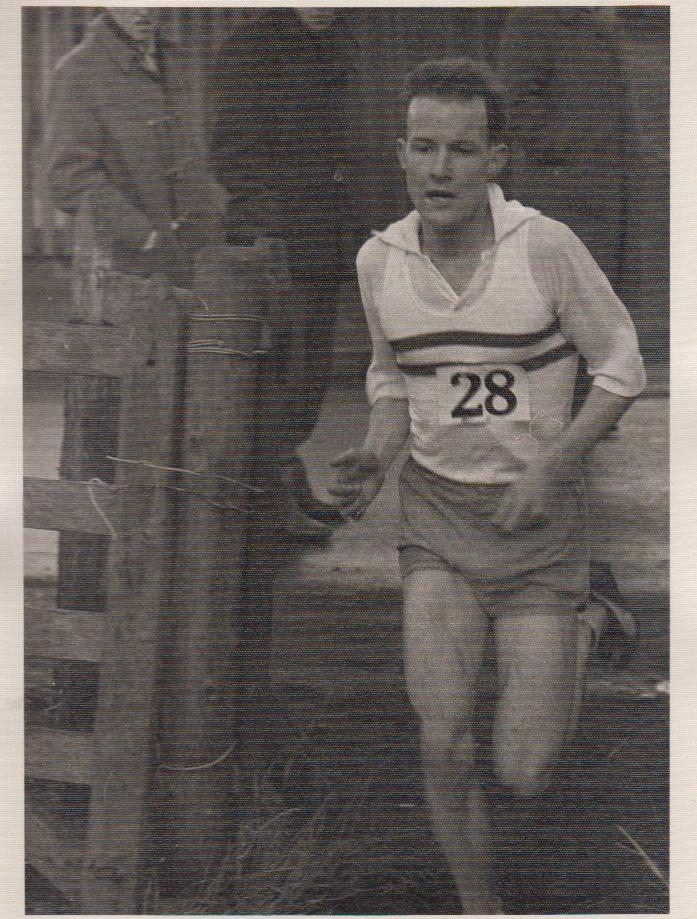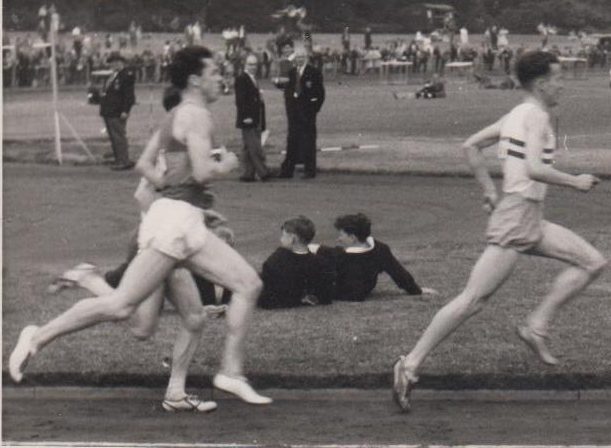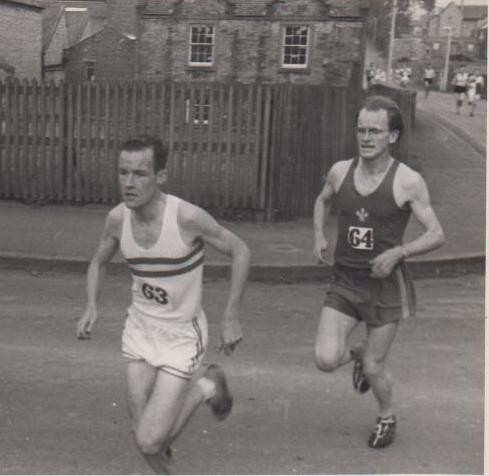The following tribute to Steve is by his friend and team mate Fraser Clyne.
The man who made history by becoming Aberdeen AAC’s first Scotland international runner has passed away.
Steve Taylor made his mark in the late 1950’s and early 1960’s as one of the country’s top athletes over a variety of distances. Although most of his greatest achievements came on the track, he was also an accomplished cross country runner and made his Scotland debut at the 1960 international championships at Hamilton racecourse where he finished 45th. He made two further appearances in this annual match, which was a precursor to the modern day world championships, finishing 58th at Nantes in 1961 and 35th at Sheffield in 1962.
Taylor enjoyed considerable track success, winning his first Scottish title at Meadowbank in 1961 after an epic battle with close friend and training partner Alastair Wood. Wood had set a Scottish native record when winning gold in the six miles the night before, but that didn’t prevent him from pushing his Aberdeen clubmate all the way. Taylor had to use all his pace, power and strength of character to earn victory by the slenderest of margins, stopping the clock at 14min 29.9secs with Wood breathing down his neck 0.01secs behind.
He retained the title the following year when recording 14:10.4 but his fastest performance over this distance came at the 1966 championships when he recorded 13:47.8 to finish behind Olympian Fergus Murray (Edinburgh University) who won in a championship record of 13:46.0.
Taylor had also lost out in the six miles the year before to another Scottish athletics legend, the future Commonwealth Games 10,000m gold medallist Lachie Stewart. In addition to his two gold and two silver medals in the three miles, Taylor picked up silver (1960) and bronze (1959) in the one mile and bronze (1964) in the six miles at the Scottish championships. He also represented Scotland in five track internationals between 1961 and 1966.
Moving up to longer distances he won the national 10 miles track title at Scotstoun, Glasgow in 1970, recording 49:52.6 to finish one minute ahead of another Aberdeen runner and future world ultra-distance record breaker, Donald Ritchie.
Taylor was willing to help others, none more so than his old sparring partner Wood whom he paced to a world 40 mile track record at Pitreavie in 1969. The duo also shared Scottish 30km, 20 miles and two hour records along the way.
Taylor also had a fascination with the John o’ Groats to Land’s End relay record. He was part of the Aberdeen AAC side which failed to break the mark in 1972 but was again heavily involved when the club slashed 30mins off the record the following year.
It was late in his career when he dabbled with the marathon, but still achieved a highly respectable best time of 2:19:28 in 1971, which is still the 12th fastest by an Aberdeen runner.
Steve leading Graham Everett in the SAAA Mile Championship
*
Steve Taylor – A Personal Tribute
by Fraser Clyne
Forty-five years ago Steve Taylor was what was called a ‘mature student’ at Aberdeen University. At 36 years of age he gave up a job with Aberdeen Journals in favour of taking a bold step into the world of higher education to study for a degree in sociology. Although his best days as an athlete were in the past, Steve continued to compete with a fair degree of success on the universities circuit.
I was also at the university at this time and had chosen to take up running as a sport, having failed miserably as a footballer. I joined the student cross country club – the Hare and Hounds – and was soon introduced to Steve. Along with Mel Edwards, he proved to be an extremely influential character in my early development as an athlete, providing me with valuable advice and educating me how to train and race properly. When he realised I was showing growing enthusiasm for the sport and making decent progress, Steve presented me with one of his Scotland international vests and indicated I should strive to earn one of my own in the future. I was overwhelmed that he had such confidence in me and I have proudly held on to that vest to this day.
Steve introduced me to interval training and preached its benefits. One of his favourite sessions was 20x200metres with a very short recovery. These were run at a punishing pace, for me at any rate, and I would try to keep a close count of how many we were doing. On more than one occasion, when we were about to run the 20th, and were thankfully about to finish, Steve would say: ‘No, two to go’. I’m sure he frequently made me do 21. It was a positive trick to find out whether I could dig deep for an extra effort despite already being exhausted – an important quality to have when it came to racing.
He was also keen on what runners call a tempo run. Steve would take me through Seaton Park and over the undulating Royal Aberdeen golf course at Balgownie for a seven or eight mile session at a sustained fast pace. He would chat away while I was gasping for breath, barely able to reply. I cursed him, quietly to myself, for making me suffer so much, but I know it made me a better runner.
A few years later, with my fitness in the ascendancy and Steve’s slightly on the wane, I took my revenge on one of those same runs. I did all the chatting and could tell he was toiling, so I showed no mercy, and I’m sure he didn’t expect it.
Steve was a true gentleman, quietly spoken but with a strong will and a fierce competitive instinct. One of Aberdeen’s finest athletes and a thoroughly pleasant person. I will forever be grateful for the help and motivation he gave me.
Steve leading team mate Alastair Wood in the N-E League, 1961


